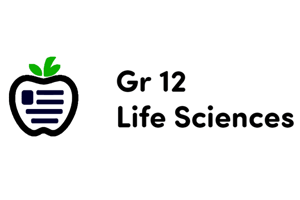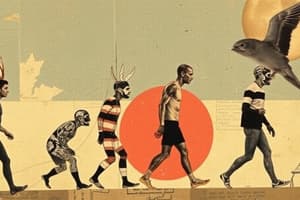Podcast
Questions and Answers
According to Lamarck's theory, what is the main reason organisms develop new traits?
According to Lamarck's theory, what is the main reason organisms develop new traits?
- The inheritance of acquired characteristics from parents
- The need to adapt to changing environmental factors (correct)
- Genetic mutations that occur randomly in the organism's DNA
- The organisms' desire to evolve
Which of the following is NOT a basic postulate of Darwinism?
Which of the following is NOT a basic postulate of Darwinism?
- Individuals within a species show variations.
- Species tend to produce more offspring than can survive.
- There is a struggle for existence between organisms.
- Individuals with advantageous traits are more likely to pass on their traits to offspring. (correct)
The theory of evolution by natural selection proposes that changes in a population occur due to:
The theory of evolution by natural selection proposes that changes in a population occur due to:
- The intentional desire of organisms to adapt to their environment
- The influence of environmental factors on the development of organisms
- The inheritance of acquired characters over generations
- The differential survival and reproduction of individuals based on their traits (correct)
In the context of Lamarck's theory, what is meant by 'inheritance of acquired characters'?
In the context of Lamarck's theory, what is meant by 'inheritance of acquired characters'?
What is a key difference between Lamarck's theory and Darwin's theory of evolution?
What is a key difference between Lamarck's theory and Darwin's theory of evolution?
What is the main purpose of Activity 4.5, 'Debating the origin of life'?
What is the main purpose of Activity 4.5, 'Debating the origin of life'?
Which of the following best describes the 'struggle for existence' as described by Darwin?
Which of the following best describes the 'struggle for existence' as described by Darwin?
In the context of Darwin's theory, what is meant by 'variation under nature'?
In the context of Darwin's theory, what is meant by 'variation under nature'?
Flashcards
Lamarckism
Lamarckism
The theory proposing organisms pass acquired traits to offspring.
Inheritance of acquired characters
Inheritance of acquired characters
The concept that traits developed during an organism's lifetime can be inherited by offspring.
Use and disuse of organs
Use and disuse of organs
The idea that organs become stronger with use and weaker with disuse in organisms.
Speciation
Speciation
Signup and view all the flashcards
Darwinism
Darwinism
Signup and view all the flashcards
Natural selection
Natural selection
Signup and view all the flashcards
Geometric increase
Geometric increase
Signup and view all the flashcards
Struggle for existence
Struggle for existence
Signup and view all the flashcards
Study Notes
Lamarck's Theory of Inheritance of Acquired Characteristics
- Proposed in 1809
- New needs: Environmental factors (light, temperature, food etc.) lead to organisms needing to change habits or behavior
- Use and disuse of organs: The greater use of certain organs strengthens them, while less use weakens them
- Inheritance of acquired characteristics: Favorable, acquired characteristics are passed on to offspring
- Speciation: Gradual accumulation of acquired characteristics over generations leads to new species
Activity 4.5 Debating the Origin of Life
- Students are assigned to groups based on theories: creationists, spontaneous generationists, etc.
- Each group prepares a case for their theory and presents it for five minutes
- The group is questioned by other members for five minutes
- Remaining members vote on the debate, not personal opinions
Lamarck's Use and Disuse
- Suggests that if a structure or process is used constantly, it develops, but unused ones diminish.
- Giraffe example: Over time straining for higher branches made their necks longer.
Inheritance of Acquired Traits
- Lamarck believed traits acquired during a lifetime could be passed to offspring.
- Example: Giraffes developing longer necks.
- This idea is now disproven by genetics.
Darwin's Theory of Natural Selection
- Proposed by Charles Darwin (1809-1882)
- Darwin's observations on the Galapagos Islands influenced his theory
- Geometric increase: Organisms produce more offspring than can survive
- Struggle for existence: Competition for limited resources
- Variation under nature: Individuals within a species vary
- Natural selection: Favorable traits increase survival and reproduction
Basic Postulates of Darwinism
- Geometric increase: Organisms produce more offspring than can survive
- Struggle for existence: Competition for resources
- Variation under nature: Individuals within a species have variations
Origin of Species
- Over long periods, suitable individuals survive, and the environment causes changes.
- Adaptations lead to new traits in organisms
- Species gradually become distinct from their ancestors as they adapt to the environment in several generations.
Neo-Darwinism
- Combines Darwin's theory with genetic knowledge
- Explains how traits are passed down better
Studying That Suits You
Use AI to generate personalized quizzes and flashcards to suit your learning preferences.




